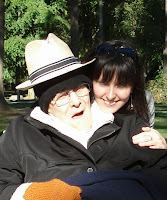I’m a bit of a fan of all things vintage, as you might have
gathered given my love of our older generations. Music is no exception to this
rule, hence the title of this blog post coming from a much loved song, ‘The way
we were’.
I’ve always felt that the lyrics to this song are a rather poignant
reminder of how life changes through the years. It also has important meanings
in relation to our memories, the invisible library that lives within our brain
and chronicles our lives. Should dementia ever set in, that library becomes
muddled, and eventually toms of knowledge are like books that have been
borrowed from the library and never returned. The person with dementia then
becomes a bit like a frantic librarian, trying desperately to remember where
they have stored the particular segment of knowledge that is required.
I wrote in 'Loving our elders and betters' about how, when an older
person dies, "It is as if a library has burnt down." Many people would argue
that dementia is like a slow burn, very gradually turning memories to cinders,
often initially with little physical evidence of the ‘fire’ taking place. Given
the choice I think some people facing such a future would rather experience a
giant inferno that engulfs their lives with such rapidity that they have no
idea that it has even happened, but dementia is rarely like that.
It teases the mind, allowing us to retain selected memories,
often those going back many years, but not always the most useful ones. Those
crucial practical memories of how to undertake and successfully complete tasks
may go very early, as can memories of what we did or said a minute,
hour, day or week ago. The precious memories of key life events, and key
individuals in our lives, may also end up being filed under absent.
Being deprived of that last set of memories is particularly painful
because they characterise our lives and us as individuals. They act as a safety blanket, giving us a place to meander into during those quiet
moments of reflection, or provide thoughts of positivity and strength when we
are feeling vulnerable or worried. We want to be able to remember people,
places and things that are important to us, knowledge we have studied hard to
acquire or experiences we want to be able to pass on, but dementia has other
ideas.
Memory problems are something we generally – and wrongly -
associate with ageing, as I wrote about here. Moreover, I think that throughout
our lives many of us are guilty of taking our own memory for granted, and in
our interactions with others we readily expect their mind to perform with seamless
speed and accuracy. We don’t have time or patience for a hunt around someone else's personal library – we want our information instantly, and not being able to
deliver that often leads to the belief that someone is unintelligent, useless,
worthless or stupid.
However dementia, and the way in which it can affect our
memories, can hit anyone and not just in old age. Having a previously brilliant
brain is no guarantee that you won’t get dementia. I’ve met leading doctors,
academics and businessmen who are living with dementia – all had hugely admired
brains that have now been ravaged. My dad, whilst never a man of
high academic standing, had a truly impressive mind – his knowledge of the
countryside, farming and animals was second to none. His wisdom was a gift that
as a child I never really appreciated. Now it’s gone, I miss it more than words
can say.
The corners of our minds harbour things that we may think we
will never need, but each memory has its place and importance and being without any
of them will adversely affect our lives at some point. We talk a lot about
memory ‘loss’ in dementia like it is something that can be found again. Sadly
even for people who achieve respite or improvement from their symptoms through
therapeutic interventions, they are still living with a terminal disease that
is characterised by eventual decline.
What I admire most, however, is the way in which many people with
dementia try to guard against this, always working to prevent dementia steeling
more books from their memory library. I think as outsiders looking in, we often
don’t realise just how hard people with dementia try in order to maintain
normality and keep all of those important memories alive. For many, notebooks
and post-it notes become their allies – the feeling being that what cannot be
remembered must be written down.
Increasingly I think technology (smartphones, tablets and
other handheld devices) will have a role to play, particularly for people who
are diagnosed with younger onset dementia and are already used to leading very
technological lives. However, I think nothing will ever really beat our loved
ones for helping to keep memories alive and effectively providing a 'Back Up Brain'* for us all, regardless of whether we develop dementia or not.
Dementia has the power to literally re-write and remove our memories, twisting, confusing and manipulating those precious nuggets of
understanding and experience that we build up over our lives. As the song tells
us, "Memories may be beautiful and yet, what’s too painful to remember, we
simply choose to forget." Having that choice is a wonderful thing that we
should never take for granted.
Until next time...
You can follow me on Twitter: @bethyb1886
*Back Up Brain – BUB – is a phrase borrowed from my inspirational
friend Kate Swaffer, an Australian lady living with young-onset dementia for whom her
husband is her primary BUB. I would recommend checking out Kate’s blog http://kateswaffer.com/daily-blog/.




